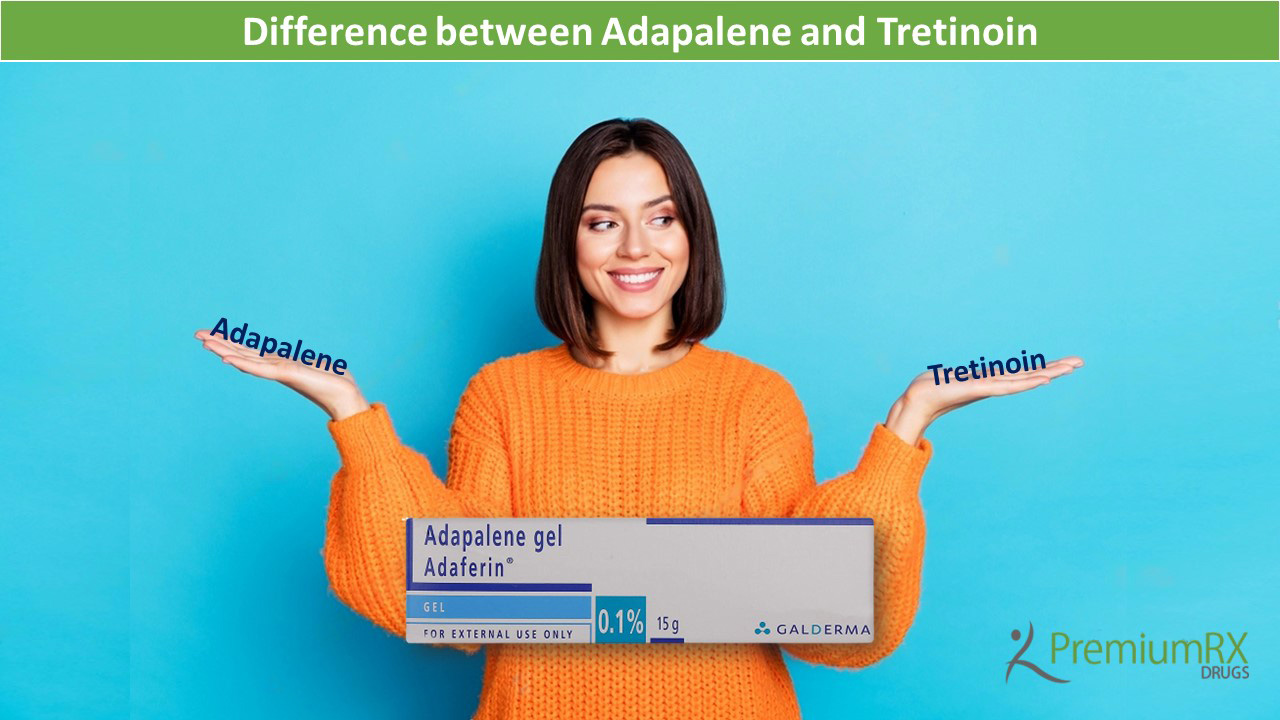Retinoids, a medication derived from vitamin A, are the primary treatment options for acne. Adapalene and Tretinoin are the most popular and widely used retinoids worldwide. When we talk about Tretinoin is a prescription-only topical medication used for decades to improve the appearance of acne-prone skin.
Adapalene is a newer third-generation retinoid available as a prescription and over-the-counter treatment. Because both products belong to the same class of medications and have similar benefits, choosing the right retinoid formulation for your skin type is not always easy. On paper, both preparations can appear exactly similar, with the same benefits and potential side effects. Below, you will find the comparison between Adapalene gel and Tretinoin, looking at everything from acne and antiaging treatment facts to their potential side effects, safety, and other factors.
Tretinoin
Used for decades to treat a range of skin concerns, Tretinoin was primarily discovered as a potential treatment for acne. It became the first retinoid approved by the food and drug administration (FDA) to help treat acne.
It is best to speak to a dermatologist before using it. To treat acne and photoaging, Tretinoin comes in cream and gel form. It may take up to several weeks to months before delivering noticeable results, and it is important to have patience and understand that it’s a process that takes time. Topical Tretinoin is supplied in various strengths, ranging from .01% to .1 % tretinoin. Dermatologists usually recommend a cream or gel with a low concentration and adjust the dosage according to the patient’s condition. Tretinoin is a well-researched retinoid, with comprehensive studies covering everything from its effectiveness and anti-acne and anti-ageing formulation to its potential side effects and mechanism of action. Overall, the retinoid formulation is safe and effective.
The commonly reported side effects include skin redness and increased sensitivity to sunlight. Other associated side effects include discolouration, inflammation, and blisters. If you begin using a tretinoin formulation and experience any of these side effects, it is best to speak with your dermatologist. While the adverse effects can be annoying, the good news is that most of them resolve within a few days of using the medicine as your body becomes accustomed to the topical medication.
Furthermore, the tretinoin group of drugs can trigger a purge, a short period in which acne worsens before it gets better. This usually lasts a few weeks of use and can be treated using a good quality moisturizer, sunscreen, and other skincare products. Overall, Tretinoin is affordable, effective, and safe to use. It works quickly and well, showing reductions in acne lesions, wrinkles, and hyperpigmentation for some in just three months of use.
Adapalene
Adapalene is a recently introduced topical treatment for mild to moderate acne, which has been demonstrated to be much better tolerated and at least as effective as tretinoin 0.025% gel. Like Tretinoin, Adapalene is a retinoid. However, it has several features that make it a unique ingredient compared to Tretinoin. Adapalene effectively decreases the formation of microcomedones, treats inflammation, and exfoliates mature comedones. Moreover, it is known to have a more stable chemical structure than Tretinoin, making it ideal to use alongside other topical anti-acne medications such as benzoyl peroxide.
Research shows that Adapalene is effective at treating acne. It causes a significant reduction in inflammatory and noninflammatory acne lesions. The skin care ingredient offers comparable efficacy to Tretinoin but is less likely to irritate the skin. Adapalene comes in various strengths and is sold under the brand name Differin. The stronger concentration is .03%, which is available with a prescription. As with other topical retinoids, Adapalene has several side effects. The commonly reported one is an increase in skin sensitivity and dryness, particularly during the initial days of the treatment. Some users may notice a mild stinging or burning sensation to the skin during this period. This usually subsides after a few weeks of consistent use.
Which topical medication is more effective?
Adapalene and Tretinoin are both effective in fighting off acne. Studies show that both significantly reduce acne lesions over the long term. In the case of mild to moderate acne, both formulations produce a lasting, significant improvement if used consistently. Overall, studies comparing both products find that Tretinoin is slightly more effective in treating acne. Moreover, studies show that Tretinoin typically produces higher levels of skin irritation than adaferin .1 Adapalene. This is why if you have sensitive skin that gets irritated, itchy or uncomfortable, you may better go with the less irritating nature of Adapalene.
Furthermore, the best choice is to talk to a dermatologist about the two medications and work together to choose the best according to your needs.
Marie
Latest posts by Marie (see all)
- Revize Micro Gel 0.025% | Uses, Price, Side effects - April 9, 2025
- What is Evalon Cream: How to Apply, Benefit, who Can Use - April 4, 2025
- Understanding Avanair 200 mg: A Comprehensive Guide - April 4, 2025




